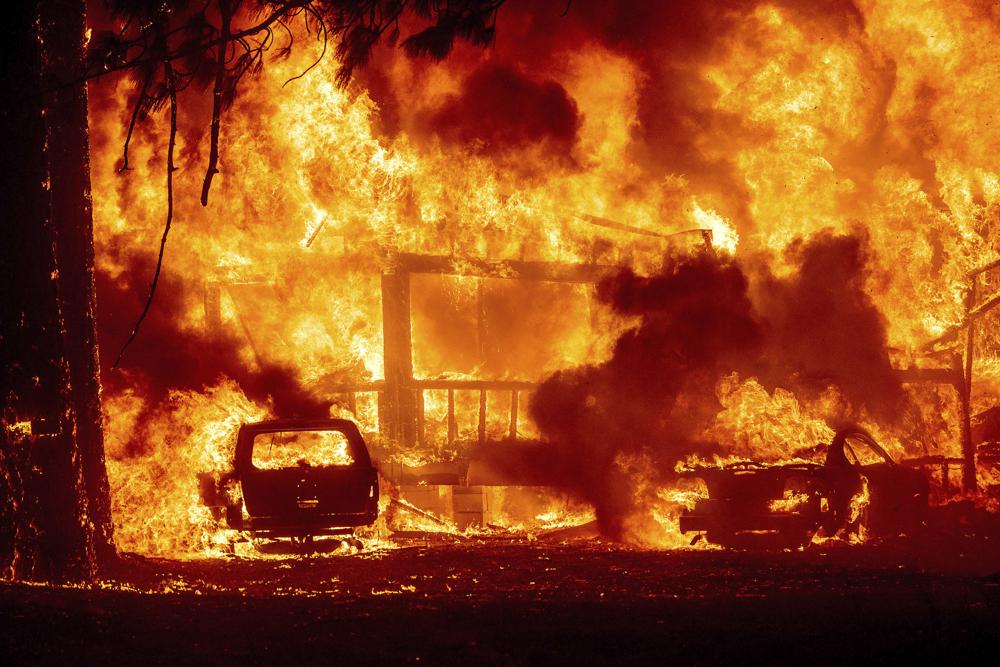The big takeaway from COP27? These climate conferences just aren’t working – “It really does beggar belief, that in the course of 27 COPs, there has never been a formal agreement to reduce the world’s fossil fuel use”

By Bill McGuire
20 November 2022
(The Guardian) – In the end, the recent shenanigans at the COP27 meeting in Sharm el-Sheikh at least ended up making modest progress on loss and damage: high-emissions nations agreeing to pay those countries bearing the brunt of climate mayhem that they had little to do with bringing about.
But, yet again, there was no commitment to cutting the emissions causing accelerating this crisis, without which this agreement is nothing more – as one delegate commented – than a “down-payment on disaster”. No seasoned observers are of the opinion that the world is any nearer tackling the climate emergency. Indeed, the real legacy of COP27 could well be exposing the climate summit for what it has become, a bloated travelling circus that sets up once a year, and from which little but words ever emerge.
It really does beggar belief, that in the course of 27 COPs, there has never been a formal agreement to reduce the world’s fossil fuel use. Not only has the elephant been in the room all this time, but over the last quarter of a century it has taken on gargantuan proportions – and still its presence goes unheeded. It is no surprise, then, that from COP1 in Berlin in 1995, to Egypt this year, emissions have continued – barring a small downward blip at the height of the pandemic – to head relentlessly upward.

Expectations were never especially high over the course of the 12 months since Glasgow’s COP26. Even so, COP27 has to be a new low – held in a country cowed by a malicious dictatorship, the world’s biggest plastic polluter on board as a sponsor, and hosting more than 600 fossil fuel representatives and many others who are there to prevent, rather than promote progress and action. Some old hands have labelled it the worst COP ever, and I doubt many would argue.
I would never question the sincerity of those working within the UN Framework Convention on Climate Change (UNFCCC), established way back in 1992, nor those embedded in the COP climate apparatus, who I know are desperate to find a solution to our predicament. I do, however, seriously wonder whether an annual extravaganza in the full glare of the world’s media is the way to do this. In all honesty, it is becoming increasingly difficult to view these events as anything other than photo opportunities for presidents and prime ministers who turn up simply to make the world think they care. The reality is that, in most cases, they have no inkling of how bad climate breakdown is set to be and little interest in finding out. In this respect, Sunak’s 24-hour flit to the Red Sea resort, to see and be seen, says it all.

And there is another huge and growing problem too. The all-encompassing nature of the annual COP climate conference provides one enormous open goal for fossil fuel representatives; an unprecedented opportunity to kettle ministers and heads of state from every corner of the planet, but particularly the majority world, to browbeat them into handing over their untouched fossil fuel reserves for exploitation. At COP27, the sharks were circling around African nations, desperate to persuade them of the urgent need for a “dash for gas” and looking for a very large piece of the action.
In retrospect, it does seem that the whole idea of annual climate carnivals was probably not the best means of promoting serious action on global heating, but their hijacking by the fossil fuel sector, and failure, year on year, to do the job they were set up to do, surely means that COP is no longer fit for purpose. The whole apparatus is simply too moribund to come up with any measures effective enough, and with sufficient clout, to bring about the changes needed to avoid climate chaos.
I don’t claim to be an expert in negotiation policy and procedure. I can, however, spot when something clearly isn’t working and needs a serious reboot. But if the annual COP climate conferences go then what would replace them? [more]
The big takeaway from COP27? These climate conferences just aren’t working

COP27 deal delivers landmark on ‘loss and damage’, but little else
By Valerie Volcovici, Dominic Evans, and William James
20 November 2022
SHARM EL-SHEIKH, Egypt (Reuters) – Countries adopted a hard-fought final agreement at the COP27 climate summit early on Sunday that sets up a fund to help poor countries being battered by climate disasters – but does not boost efforts to tackle the emissions causing them.
After tense negotiations that ran through the night, the Egyptian COP27 presidency released the final text for a deal and simultaneously called a plenary session to quickly gavel it through.
The swift approval for creating a dedicated loss and damage fund still left many of the most controversial decisions on the fund until next year, including who should pay into it.

Negotiators made no objections as COP27 President Sameh Shoukry rattled through the final agenda items. And by the time dawn broke over the summit venue in the Egyptian resort of Sharm el-Sheikh on Sunday, the deal was done.
Despite having no agreement for tougher emissions reductions, “we went with what the agreement was here because we want to stand with the most vulnerable,” said Germany’s climate secretary Jennifer Morgan, visibly upset.
Delegates praised the breakthrough on setting up the fund as climate justice, for its aim in helping vulnerable countries cope with storms, floods and other disasters being fuelled by rich nations’ historic carbon emissions.
When asked by Reuters whether the goal of stronger climate-fighting ambition had been compromised for the deal, Mexico’s chief climate negotiator Camila Zepeda summed up the mood among exhausted negotiators.
“Probably. You take a win when you can.”

Fossil fuel fizzle
The two-week summit has been seen as a test of global resolve to fight climate change – even as a war in Europe, energy market turmoil and rampant consumer inflation distract international attention.
Billed as the “African COP,” the summit in Egypt had promised to highlight the plight of poor countries facing the most severe consequences from global warming caused mainly by wealthy, industrialised nations.
The United States also supported the loss and damage provision, but climate envoy John Kerry did not attend the session after testing positive for COVID-19 this week.
Negotiators from the European Union and other countries had said earlier that they were worried about efforts to block measures to strengthen last year’s Glasgow Climate Pact.
“It is more than frustrating to see overdue steps on mitigation and the phase-out of fossil energies being stonewalled by a number of large emitters and oil producers,” German Foreign Minister Annalena Baerbock said in a statement.

In line with earlier iterations, the approved deal did not contain a reference requested by India and some other delegations to phasing down use of “all fossil fuels”.
It instead called on countries to take steps toward “the phasedown of unabated coal power and phase-out of inefficient fossil fuel subsidies,” as agreed at the COP26 Glasgow summit.
“Too many parties are not ready to make more progress today in the fight against climate crisis,” EU climate policy chief Frans Timmermans said, describing the deal as “not enough of a step forward for people and planet.”
The text also included a reference to “low-emissions energy”, raising concern among some that it opened the door to the growing use of natural gas – a fossil fuel that leads to both carbon dioxide and methane emissions.
“It does not break with Glasgow completely, but it doesn’t raise ambition at all,” Norway’s Climate Minister Espen Barth Eide told reporters.

Small island nations facing a climate-driven rise in sea level had pushed for the loss and damage deal, but lamented the lack of ambition on curbing emissions.
“I recognise the progress we made in COP27” in terms of establishing the fund, the Maldives climate minister, Aminath Shauna, told the plenary. But “we have failed on mitigation … We have to ensure that we increase ambition to peak emissions by 2025. We have to phase out fossil fuel.”
The climate envoy from the Marshall Islands said she was “worn out” but happy with the fund’s approval.
“So many people all this week told us we wouldn’t get it. So glad they were wrong,” Kathy Jetnil-Kijiner said by email. Still, “I wish we got fossil fuel phase out. The current text is not enough.”
COP27 deal delivers landmark on ‘loss and damage’, but little else


